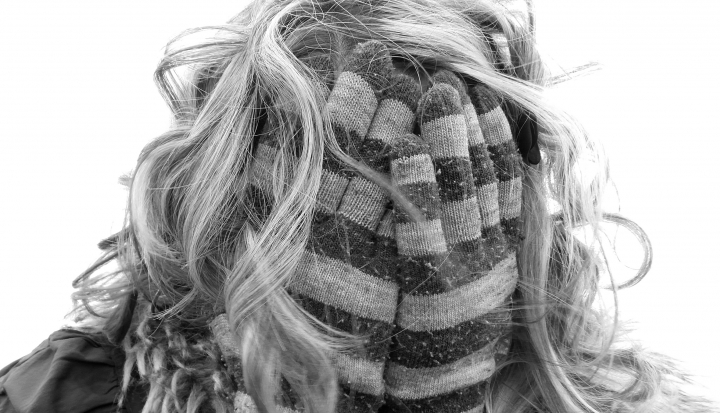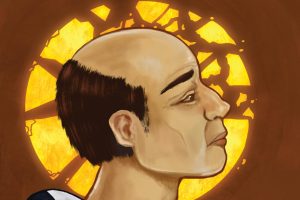By Ann LeBlanc
I’m not a good Catholic.
I can be arrogant, intolerant, and self-centered. I’m judgmental, I swear, and I can (and do) say perfectly horrible things about nice people in very entertaining ways. I don’t get really enraged too often these days, but when really ticked off I’m good at saying artistically nasty things. When disappointed or hurt or frustrated, I try to make God feel bad by shunning him. I’m critical and selfish.
This is just the tip of the iceberg and doesn’t cover my more colorful and less printable past. It doesn’t worry me terribly. I’m creeping at a glacial pace in the general direction of perfection and trying to keep the many detours short and in perspective.
I’m not a person who struggles much with anxiety and fear. I don’t usually worry about what other people think of me. In fact I would probably be more successful socially if I had a little more anxiety and self-consciousness. It’s not something that keeps me up nights, though.
Not long ago, however, I kept silent about some of my imperfections out of fear.
It was a meeting at church. Some parishioners were talking passionately about who could say they were “good” Catholics and who couldn’t and how “good” Catholics had to stand up for what was right and what the church teachers.
They said that people who use contraception cannot be good Catholics, that people who would permit abortion in certain cases are not good Catholics, that people who tolerate homosexuality are not good Catholics. In their minds, or at least in what they said out loud, there was no room for questioning or uncertainty; absolute, unequivocal belief in church teaching was required.
They said it was the responsibility of “good” Catholics to speak out against these things constantly, and priests should preach about them more. Tolerance, to them, was the same as acceptance and represented a failure to boldly speak the truth.
They spoke about “those people” who harbored doubts about such things, about how “those people” cannot call themselves good Catholics, and that we should not let “those people” think they are. In charity we should confront “those people” with the teachings of the church and the error of their ways.
I kept silent. I was afraid. I’m one of “those people.”
I didn’t say that I haven’t always been sure that abortion was wrong in each and every situation. I remembered talking with a 12-year-old girl, pregnant by her own father, puzzled by her bloated body and the interest taken by her older brother in her swelling breasts. Did I think that an abortion would right this wrong? No. did I think that the fetus was anything but innocent? Of course not. Did I entertain the thought that an abortion would have been permissible in this case? Yes, I did.
I didn’t say I think that responsible sexual behavior can include certain kinds of contraception. While these decisions were behind me, I didn’t talk about how I had struggled with what might or might not have been sinful in the past. I didn’t say that I could understand how couples make this decision, that I couldn’t condemn them. Do I know what the church teaches? Yes, I do. Will I point the finger at couples who choose otherwise? No, I won’t.
I didn’t say I had no intention of making assumptions about what homosexual couples might or might not do in bed. I thought of two friends of mine, actively Catholic men who have lived together 25 years with nary a public statement about their sexual orientation. I didn’t say that, as far as I was concerned, how they manage their sexuality is between them, God, and their confessors. Do I know that sex outside of marriage is sinful? Yes, I do. Am I going to make proclamations about what I think is happening in certain bedrooms or turn away from certain people at Mass? No, I’m not.
A few people more courageous than I suggested that good people struggle to make the best informed decisions they can in light of particular circumstances, that it’s not easy, that we’re not perfect.
“That sounds an awful lot like situational ethics,” came the prim response from someone who took a course in it once. “Situational ethics,” the eighth cardinal sin, a phrase invoked with totemic qualities to condemn us waffling Catholics tempted by uncertainty and questions of individual conscience.
Out of fear I said none of these things. As I write them, I wonder, “Will they put me out?”
Will I find that I’m no longer on the lector schedule, that my flowers and gardening are no longer needed, that someone else will set up for Mass on Friday mornings, that it’s time to give another person a chance to organize little projects? Will they kick me off the rosary rotation? Will the elderly I visit turn me away? Will they let me serve on committees? Will “good” Catholics allow me in their homes? Will they let me receive Communion? Will they point at me in church?
It sounds a little overblown now that I write it down, too dramatic, over the top. It’s in the back of my mind, though.
Already I’m suspect. I’m married to a non-Catholic; I have no children. When I returned to the faith after 30 years, there were subtle and not-so-subtle questions about the validity of my marriage, about whether my kids were grown. At one point someone told me that every time I had sex with my husband it was a mortal sin. I promptly went off the deep end, only to be dragged back, snarling and biting, by the priest who was patiently trying to convince me that God would have me.
Since then, God has kept converting me. I’m not certain about all the things that good Catholics are supposed to be certain about, but I haul my conscience out to be formed in conversation, in Reconciliation, in prayer, in reading, in listening. I acknowledge that the wisdom of the church is greater than my own and that I have far to go in understanding it.
Some things I embrace. Some I just accept. Some I struggle with. Some I think are just ridiculous.
Quite often I think I’m a hypocrite. A while ago, for example, our pastor, Father Phil, gave a homily about obedience. He talked about how we expect obedience from others, as parents or as supervisors at work, but don’t like to be obedient ourselves. He talked about how we like to pick and choose which of God’s laws we will obey and which of the church’s teachings we will follow.
I sat there and thought, “Yup. That’s me all right. One of those pickers and choosers.” And I thought that maybe, picker and chooser that I am, I have no business serving in any capacity, no matter how minor, in our parish. To do so would be to suggest that I am at least a “good enough” Catholic, which I so obviously am not. I wondered if I should sit in the back of the church, keep a low profile, stay out of the way, act like the second-class Catholic that I am.
I might as well proclaim it: “My name is Ann, and I’m a bad Catholic.”
My not-that-fearless, more-or-less-searching inventory has revealed a great list of sins and no shortage of weaknesses. It’s not that I think I’m a bad person; my self-esteem doesn’t appear to be totally shot or anything. I can see that there is good in me. I don’t think I’m powerless against sin, but I acknowledge I’m completely dependent on a higher power.
As a Catholic, though, I come up short. I’m thinking of seeking out other bad Catholics and banding together to try to help each other get holy. Well, holier, anyway. We’ll support and challenge each other. We’ll meet once a week, maybe have a meal; there’s probably some book we can read that will help us out…
Image: Flickr cc via Harry Potts
This essay appeared in the January 2005 issue of U.S. Catholic (Vol. 70, No. 1, pages 34–35).














Add comment